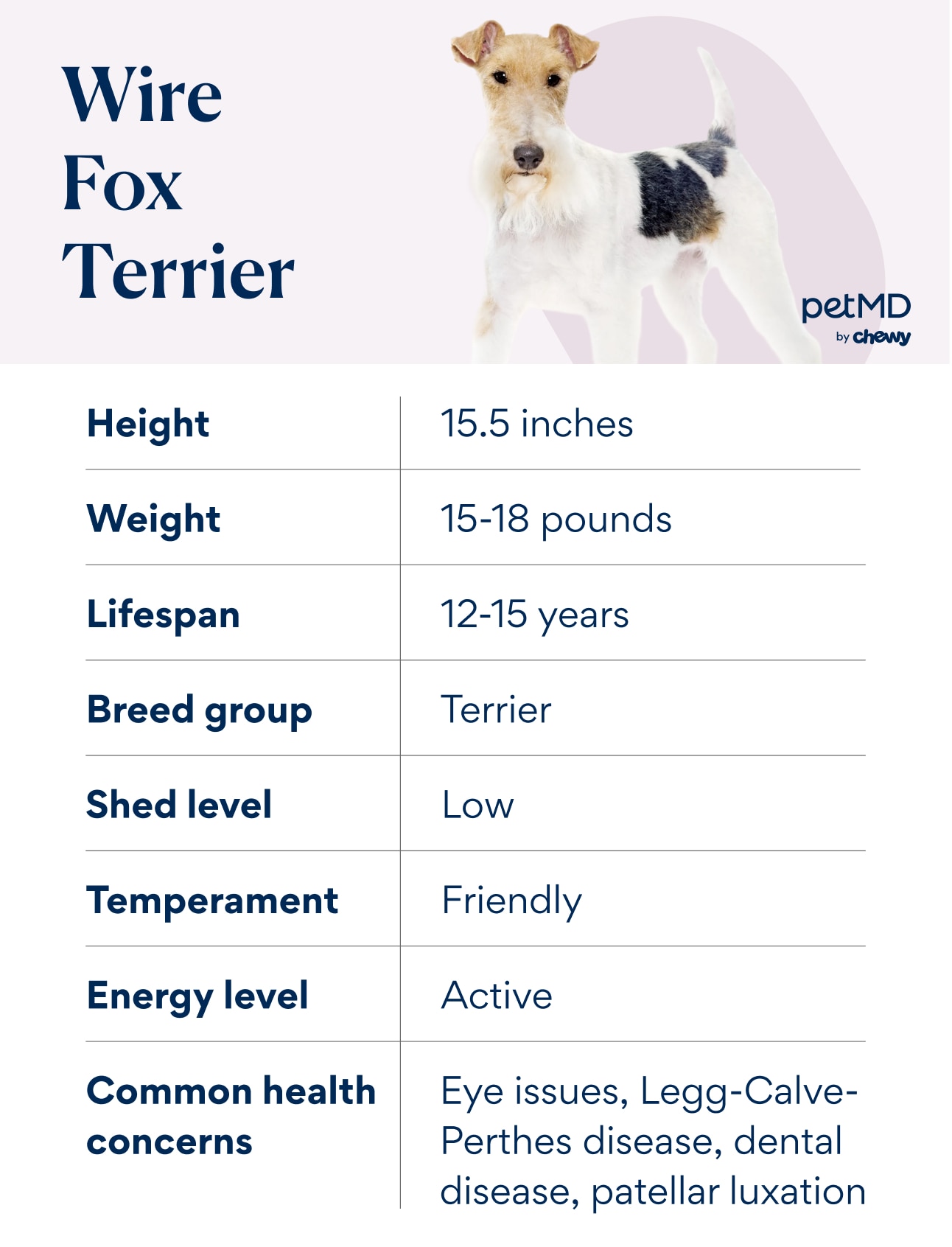Wire Fox Terrier
Adobe Stock/Tanee
The Wire Fox Terrier is the longer-coated form of what is considered one of the oldest terrier breeds.
Fox terriers can be traced back to at least the 1700s in Britain. Bred to find and flush smaller threats to livestock like foxes and rats, the small but feisty terrier was split into two standards—wire coat terriers and smooth coat terriers—in the late 1800s.
Though some organizations consider them the same breed, Wire Fox Terriers are recognized by the American Kennel Club (AKC) as a separate breed.
The working dog rose in popularity as a family companion in the 1930s due to the antics of Asta, the Wire Fox Terrier that starred in “The Thin Man” mystery films.
Though they do benefit from an active home, crime-solving is not required to keep this friendly dog a happy member of the family.
Caring for a Wire Fox Terrier

Wire Fox Terriers, like most terrier breeds, are small in size but large in personality. Standing about 15 inches tall and weighing 15–18 pounds, they can adjust to city life but generally do best with the opportunity to run in and explore a large backyard.
Keeping their mind and body sharp with trick-training and agility helps avoid behavior problems stemming from boredom and inactivity.
Are Wire Fox Terriers Good Family Dogs?
Wire Fox Terriers are usually great family dogs, though they may prefer older children who understand boundaries. They should be closely monitored with young children and small pets because of their high prey drive.
Introductions to other dogs, smaller pets, and kids should be done properly and slowly.
Do Wire Fox Terriers Shed a Lot?
Their wiry coat sheds minimally and is relatively low-maintenance, though routine brushing at home helps distribute skin oils and keeps their long guard hairs from snagging.
Wire Fox Terrier dogs also benefit from having their topcoat stripped (a process in which the hair is removed by the root) by a groomer a few times a year, but most of their coat care can be completed at home.
Wire Fox Terrier Temperament and Personality
Wire Fox Terriers were developed as working dogs. And while they have transitioned to a companion breed in modern society, their intelligence and desire to perform a job remains strong.
How Much Exercise Does a Wire Fox Terrier Need?
These dogs are high-energy, so don’t expect them to be content sitting on the couch all day. Keeping their mind engaged with obedience and trick training is imperative to avoid destructive behaviors that arise from boredom.
They need at least an hour of exercise every day. If you are looking for a laid-back and predictable dog, look elsewhere.
Are Wire Fox Terriers Good With Kids?
Wire Fox Terriers generally get along well with older children and other family dogs. But be cautious with young children who may not communicate well with them.
Training and Behavior Tips for Wire Fox Terriers
These tenacious terriers have an innate confidence and tendency to react first in stressful situations. Poorly socialized Wire Fox Terriers without boundaries may be prone to destructive and undesirable behaviors.
Do Wire Fox Terriers Bark a Lot?
Like most terriers, Wire Fox Terriers are a vocal breed.
To agitate their prey and alert hunters, Wire Fox Terriers have a loud, sharp bark. Today’s companion dogs will likely use this bark often to communicate with their pet parents about new dogs, squirrels, or mail carriers who surprise them. Don’t count on your Wire Fox Terrier to be a quiet, calm dog.
Along with barking, Wire Fox Terriers are excellent diggers, thanks to their hunting history. Unattended terriers will make quick work of digging under garden fences or pulling up flowers in the flower bed, so ensure that your yard is well secured. Monitored outdoor activity may be best for this breed.
Are Wire Fox Terriers Easy To Train?
Wire Fox Terriers are extremely intelligent dogs that have the capacity to learn many skills and tricks. That said, they are also independent. Getting them to do things your way will require consistent communication, lots of training time, and positive reinforcement.
Socialize your Wire Fox Terrier puppy well when they are young, and teach them to give you their attention quickly in stressful or new situations. Training will be a lifelong endeavor that you will hopefully both enjoy.
What Are Fun Activities for Wire Fox Terriers?
Wire Fox Terrier Health Issues

Wire Fox Terriers are generally a healthy breed with few specific disease predispositions. They typically live 12–15 years.
Lens Luxation
Terrier breeds are prone to primary lens luxation, where the fibers that center and suspend the clear disk that helps us focus our vision (lens) are genetically weakened.
This causes the lens to move into an abnormal position, which can lead to inflammation of the eye (uveitis) or a buildup of fluid pressure (glaucoma). These conditions lead to severe eye pain and can cause blindness, so they should be treated immediately.
Symptoms you may see at home are tearing, blinking, rubbing at the face, asymmetrical pupils, or even a blue color to the surface of the eye (cornea). Some cases of primary lens luxation can be treated with eye drops, while others may require surgical removal of the lens or even the entire eye to keep your pup comfortable.
Legg-Calve-Perthes Disease
Seen in many small breeds of dog, Legg-Calve-Perthes is a disease where part of the bone in the hip joint begins to degrade in extremely young dogs due to a lack of blood supply.
Although the exact mechanism remains unknown, it results in weakening of the hip joint and can lead to fractures of the top of the thigh bone (femur) with normal activity.
Symptoms include hind limb pain, limping, and weakness in Wire Fox Terrier puppies, usually those under 1 year old. X-rays are required to distinguish this disease from other causes of hind limb pain.
Once diagnosed, a procedure called a femoral head ostectomy can be performed to remove the abnormal bone. Some dogs will be candidates for a total hip replacement, depending on the extent of the disease. Luckily, most small-breed dogs respond well to surgery and go on to live happy, pain-free lives.
Patella Luxation
Another common syndrome in small-breed dogs, patella luxation is where the kneecap no longer sits properly in the knee joint and moves (luxates) to either side as a dog walks or runs. Mild cases may only be noted by your veterinarian on a physical exam, while more severe cases may result in a hopping, three-legged gait.
Many cases are managed medically with joint supplements and weight management. Severe cases that result in other ligament damage or an inability to move the leg properly may require surgery.
Dental Disease
Oral hygiene is extremely important in small dogs like Wire Fox Terriers, as they are much more prone to tartar accumulation and gingivitis than larger breeds. Allowing dental disease to progress leads to painful tooth root abscesses, loss of teeth and jaw bone density, and can even affect kidney and heart health.
Preventing dental disease starts at home by training your puppy to accept daily tooth brushing. Some dogs require yearly anesthetic dental cleanings. Your veterinarian will help you monitor your dog’s oral health and come up with an individual plan to keep their mouth healthy.
What To Feed a Wire Fox Terrier
Wire Fox Terriers have no specific dietary requirements across the breed, but their food needs to meet the nutritional guidelines set by the Association of American Feed Control Officials (AAFCO).
The Best Food for Wire Fox Terriers
Wire Fox Terriers benefit from any well-balanced commercial diet formulated for their age range. Dogs who compete in hunting trials or agility may benefit from a higher-calorie sport formulation, such as Purina Pro Plan Sport Performance dog food.
Discuss your dog’s diet with your veterinarian. They can help you choose the best dog food for your pet based on their age, lifestyle, and health.
How To Feed a Wire Fox Terrier
Wire Fox Terrier puppies under the age of 4 months will benefit from frequent, small meals (four or five per day) to avoid low blood sugar, which can be seen in small-breed puppies.
For full-grown Wire Fox Terriers, two or three meals a day should be more than enough to keep them satisfied and healthy. Consider a puzzle feeder for these intelligent dogs, which will help satisfy their desire to solve problems.
How Much Should You Feed a Wire Fox Terrier?
Keeping Wire Fox Terriers slim will help them avoid orthopedic and metabolic issues as they age. Be sure to measure (or even weigh) your terrier’s food according to the label recommendations of the food you choose.
If you are concerned that your pup is gaining too much weight (or not eating enough), discuss changes with your veterinarian. Don’t forget to include training treats for your Wire Fox Terrier’s fun tricks in their daily calorie goals!
Nutritional Tips for Wire Fox Terriers
Typically, healthy Wire Fox Terriers eating a balanced commercial diet that meets the standards set by the AAFCO should not need nutritional supplements. Do not give your dog supplements without talking to your vet first.
Wire Fox Terrier Grooming Guide

Wire Fox Terriers shed minimally and require minimal grooming, aside from regular brushing, to keep their longer hairs from tangling. But to maintain a show-level coat, hand-stripping— wherein the dead hairs are plucked from the coat to avoid a bushy appearance—is recommended three to four times a year.
Skin Care
Healthy Wire Fox Terriers benefit from bathing with a dog shampoo about once a month, or as needed, to keep their skin free of dirt and debris.
Coat Care
With their long and wiry topcoat hairs, brushing your dog every other day is recommended to avoid knots and mats. Maintaining the classic Wire Fox Terrier show appearance also requires rigorous hand-stripping a few times a year.
Eye Care
Wire Fox Terriers do not require special care for their eyes. But because they are known to develop primary lens luxation, notify your vet if you notice changes in your dog’s eyes or vision.
Ear Care
Wire Fox Terriers do not require special care for their ears. Talk to your vet about how often you should clean your dog’s ears.
Considerations for Pet Parents
Friendly, engaging and small in stature, Wire Fox Terriers do best in an active household with plenty of time to dedicate to training and active play. A bored dog is prone to behavior issues.
The energy level of children is perfect for this breed, but these working dogs will be safest with kids who understand and respect a dog’s boundaries.
Bred to run with horses and ride with hunters, Wire Fox Terriers should have at least a small yard to run freely, explore, and call their own. Make sure any off-leash time is supervised and in a well-secured area, as these dogs know how to dig burrows and escape.
Routine health care, preventatives, and vaccinations should be enough for a healthy terrier to live well into their teens.
Wire Fox Terrier FAQs
Are Wire Fox Terriers hypoallergenic?
Wire Fox Terriers don’t shed a lot, but they’re not considered hypoallergenic dogs. There’s actually no such thing as a truly hypoallergenic pet.
Are Wire Fox Terriers rare?
Although a historic and iconic breed, the Wire Fox Terrier population has fallen significantly since its most popular point in the late 1940s, likely due in part to the decreased popularity of fox hunting. However, reputable Wire Fox Terrier breeders can still be found nationwide.
Are Wire Fox Terriers cuddly?
Individuals may vary, but most Wire Fox Terriers are described as friendly but independent. They are very attached to their families but may prefer activities like fetch and hiking over snuggling on the couch.

